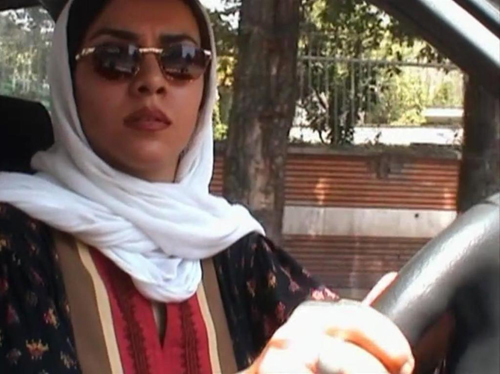Abbas Kiarostami’s Ten (2002) opens with a confrontation between mother and son. Amin is furious with his mother, a beautiful, animated taxi driver who struggles to find happiness in a society that she believes denies women the right to live.
Riding in cars with Iranian women

Abbas Kiarostami’s Ten (2002) opens with a confrontation between mother and son. Amin is furious with his mother, a beautiful, animated taxi driver who struggles to find happiness in a society that she believes denies women the right to live.
The Iranian director has explored many themes in his career of 40-plus years. He is known for his child protagonists, meditations on contemporary Tehran and for filming in cars.
In Ten, Kiarostami uses dashboard cameras to document several conversations between a female taxi driver and her passengers. The results are somewhat mixed. Ten’s 10 conversations often veer from electrifying to dull in seconds, and the film’s improvisational dialogue makes it impossible for viewers to predict the twists and turns of any one conversation.
In this project, Kiarostami has removed himself completely from the film. The dialogue and plot are loosely based on incidents in main actress Mania Akbari’s life. Her character’s son, Amin, is portrayed by Akbari’s son (who shares a name with his onscreen counterpart). A cast of amateur actors and unpredictable, shaky dashboard footage completes the unpredictable, reality-show quality that makes Ten simultaneously frustrating and fascinating.
Observing other people’s intimate conversations is profoundly uncomfortable, especially when you feel like they know you’re watching. Ten’s conversations are devastatingly real, and its close-ups and unpredictable transitions make you feel like you’re along for the ride, whether you want to be or not.
Amin despises his new stepfather and claims that it was selfish of his mother to ask for a divorce—especially, he says, because she falsely accused his father of a drug habit during the court proceedings. Akbari defends herself: Society forced her to lie to get a divorce, she says. This early confrontation sets the stage for her and her passengers to deconstruct their social roles in the bizarre intimacy of a cab ride.
Ten’s focus on individual stories ensures that the film never becomes heavy-handed. Kiarostami is notable for his open-ended films. He once told an audience member that his films are about information. “I present certain things, and it’s up to you to conclude what you will,” he said at the 2000 San Francisco International Film Festival.
Kiarostami is famous as one of the few Iranian directors who has continued to film in Iran despite the government’s refusal to screen his films and persistent persecution of artists. Ten makes a compelling case for his decision. Although the film is comprised exclusively of close-up shots of the actors as they speak, Tehran is as much a character as any of the cab’s passengers.
Akbari’s customers pepper their confessions with directions and daily errands, grounding the film’s occasional subversion with stark reminders of reality in modern Iran. When the characters leave Akbari’s car, they transition from the private into the public sphere. Inside the cab, they’re free to discuss self-actualization.
But Tehran asserts itself, even inside the car’s otherwise liminal space. Even behind closed doors, it seems that Akbari and her female passengers are somehow reacting to their surroundings.
A prostitute mistakenly believes Akbari is a male driver, and her son chastises her for not hewing to feminine conventions during their arguments. In a matter of moments, Akbari transforms from an enraged driver in the grips of testosterone-induced road rage to a meek woman begging a shop owner for a parking space.
“I think they don’t understand my films, and so [they] prevent them being shown, just in case there is a message they don’t want to get out,” Kiarostami once said of Iranian censors.
Ten often makes the viewer wonder whether the censors might be onto something. Is Kiarostami’s insistence on objectivity actually a screen for sharp social criticism? At times, it seems like Ten has something to say that goes beyond dialogue.
Two passengers never appear onscreen: a prostitute and an extraordinarily pious woman. Are these women invisible? Or does their physical absence suggest that they could be anyone?
Akbari’s car seems to perform some of the same functions as the ever-present veil. When one passenger shifts her head covering to reveal a shaved head, it’s a clue that that there are secrets hidden in plain sight.
Akbari repeats several times to her passengers that “you must love yourself before you can love anyone else.” Variously addressed to a jilted bride, her skeptical sister and her angry son, her mantra takes on new significance each time. Akbari, it seems, is able to struggle toward self-actualization because of the encounters that can occur in those odd spaces that are somewhere between public and private.
But as the noise of Tehran’s insistent traffic interrupts these rare quiet moments, Ten seems to remind us that someone is always watching.
Ten (2002)Friday, May 25, 7 and 9:30 p.m.
Saturday, May 26, 7 and 9:30 p.m.
Sunday, May 27, 3 p.m.
Free for PSU students;
$2 all other students and seniors;
$3 general admission






